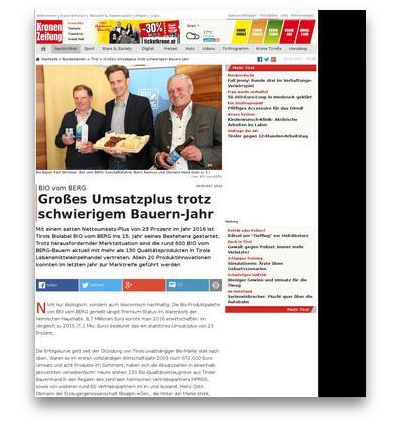
Large increase in sales despite difficult farming year
Tirol's organic label BIO vom BERG started its 15th year of existence with a whopping 23 per cent increase in net sales in 2016. Despite the challenging market situation, the 600 or so BIO vom BERG farmers are currently represented in Tyrol's food retail sector with more than 130 quality products. Last year alone, 20 product innovations were brought to market maturity. source: www.krone.at
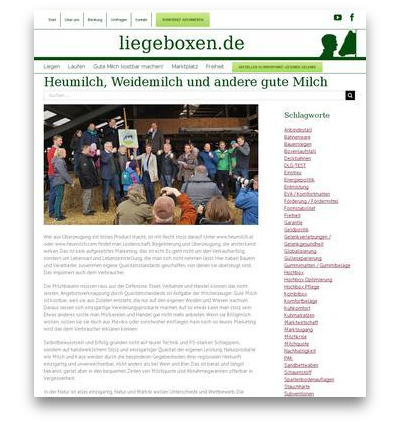
Hay milk, pasture milk and other good milk
Anyone who makes a great product out of conviction is rightly proud of it. At www.heumilch.at or www.heumilch.com you will find passion, enthusiasm and conviction that are contagious. It's not fake marketing, it's genuine. It's not about sales success, but about a way of life and an attitude to life that cannot be taken away. Farmers and processors have worked together to create their own quality standards that they are convinced of. This also impresses the consumer. source: liegeboxen.de
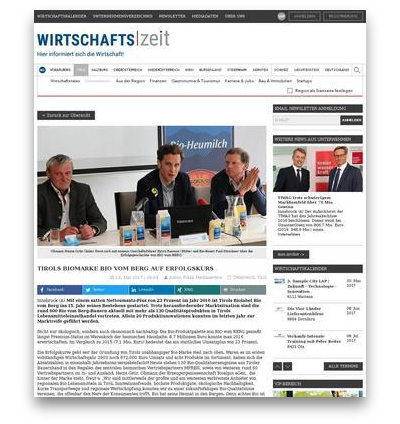
Tyrol's organic brand Bio vom Berg on the road to success
Tirol's organic label Bio vom Berg started its 15th year of existence with a whopping 23 per cent increase in net sales in 2016. Despite the challenging market situation, the 600 or so Bio vom Berg farmers are currently represented in Tyrol's food retail sector with more than 130 quality products. Last year alone, 20 product innovations were brought to market maturity. source: tirol.wirtschaftszeit.at
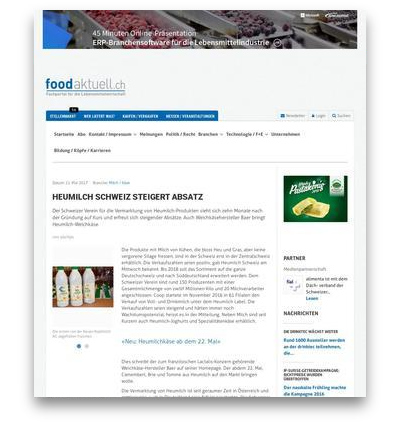
Haymilk Switzerland increases sales
Ten months after its foundation, the Swiss association for the marketing of hay-milk products considers itself to be on track and is enjoying rising sales. Soft cheese manufacturer Baer also sells hay-milk soft cheese. The products made with milk from cows that only eat hay and grass, but no fermented silage, are only available in central Switzerland. The sales figures are positive, Heumilch Schweiz announced on Wednesday. The range is to be expanded to cover the whole of German-speaking Switzerland and southern Germany by 2018. Around 150 producers with a total milk volume of twelve million kilos and 20 milk processors are members of the Swiss association. Coop launched the sale of whole and drinking milk under the hay milk label in 61 shops in November 2016. According to the press release, sales figures are rising and still have potential for growth. In addition to milk, hay-milk yoghurts and speciality cheeses have also recently become available. source: www.foodaktuell.ch
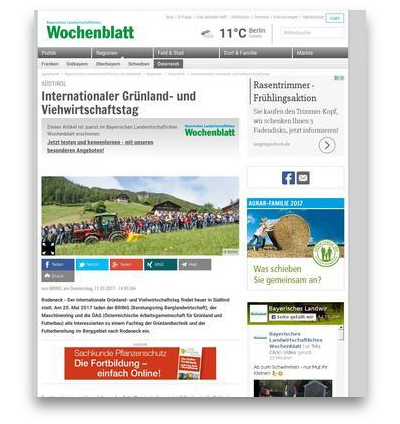
International Grassland and Livestock Day
Rodeneck - This year's International Grassland and Livestock Day will take place in South Tyrol. On 20 May 2017, BRING (Beratungsring Berglandwirtschaft), Maschinenring and ÖAG (Österreichische Arbeitsgemeinschaft für Grünland und Futterbau) invite all interested parties to Rodeneck for a symposium on grassland technology and forage preparation in mountain areas. source: www.agrarheute.com
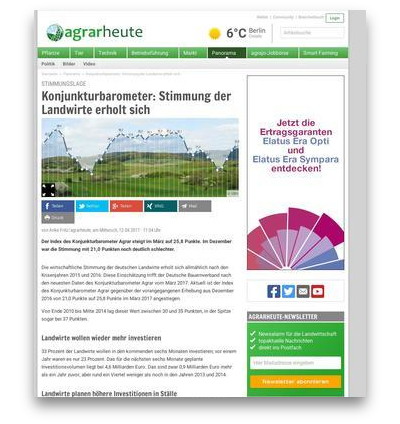
Economic barometer: Farmers' mood recovers
The economic mood among German farmers is gradually recovering after the crisis years of 2015 and 2016. This is the assessment of the German Farmers' Association according to the latest data from the Agricultural Business Barometer from March 2017. The index of the Agricultural Business Barometer has currently risen from 21.0 points to 25.8 points in March 2017 compared to the previous survey from December 2016. From the end of 2010 to mid-2014, this value was between 30 and 35 points, and even peaked at 37 points. Source: www.agrarheute.com
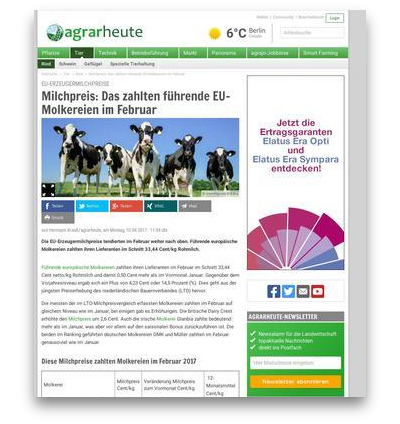
Milk price: this is what leading EU dairies paid in February
EU producer milk prices continued to trend upwards in February. Leading European dairies paid their suppliers an average of 33.44 cents/kg of raw milk. Leading European dairies paid their suppliers an average of 33.44 cents net/kg of raw milk in February, 0.50 cents more than in the previous month of January. This represents an increase of 4.23 cents or 14.5 per cent (%) compared to the previous year. This is according to the latest price survey by the Dutch Farmers' Organisation (LTO). Source: www.agrarheute.com
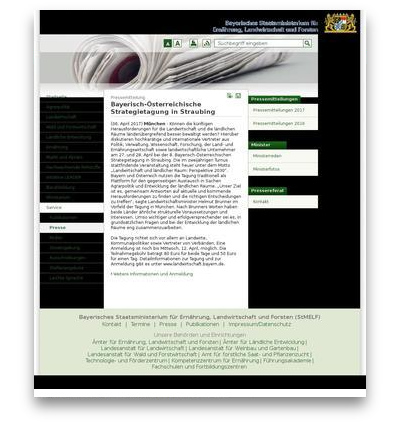
Bavarian-Austrian strategy conference in Straubing
(06 April 2017) Munich - Can the future challenges facing agriculture and rural areas be better tackled across national borders? Top-class and international representatives from politics, administration, science, research, the agricultural and food industry and agricultural entrepreneurs will be discussing this at the 8th Bavarian-Austrian Strategy Conference in Straubing on 27 and 28 April. The event, which takes place every two years, is being held this year under the motto "Agriculture and rural areas: prospects for 2030". Bavaria and Austria traditionally use the conference as a platform for mutual dialogue on agricultural policy and the development of rural areas. "Our aim is to work together to find answers to current and future challenges and to make the right decisions," said Agriculture Minister Helmut Brunner ahead of the conference in Munich. According to Brunner, both countries have similar structural requirements and interests. This makes it all the more important and promising to work closely together on fundamental issues and the development of rural areas. Source: www.stmelf.bayern.de
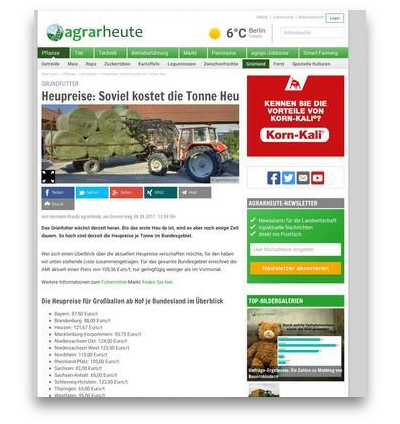
Hay prices: This is how much a tonne of hay costs
The green fodder is currently growing. However, it will be some time before the first hay arrives. This is how high the hay prices per tonne are in Germany at the moment. We have compiled the list below for those who want to get an overview of the current hay prices. The AMI currently calculates a price of 105.36 euros per tonne for the whole of Germany, only slightly less than in the previous month. source: www.agrarheute.com
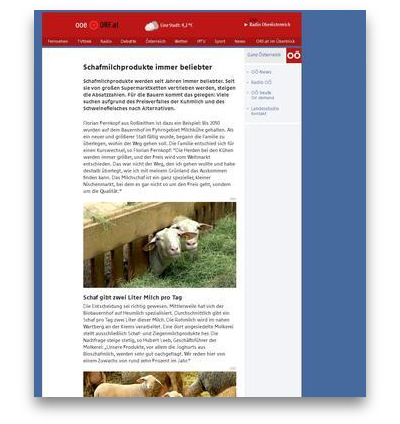
Sheep's milk products increasingly popular
Sheep's milk products have been growing in popularity for years. Since they have been sold by large supermarket chains, sales figures have been rising. This comes in handy for farmers: Many are looking for alternatives due to the fall in the price of cow's milk and pork. Florian Pernkopf from Roßleithen is an example of this: until 2010, dairy cows were kept on the farm in the Pyhrn region. When a new and larger barn was due, the family began to think about where to go next. The family decided to change course, says Florian Pernkopf: \"The herds in cows are getting bigger and bigger, and the price is decided by the world market. That wasn't the way I wanted to go, so I thought about how I could make a living from my grassland. Dairy sheep are a very special, small niche market that is not so much about price, but about quality." Source: ooe.orf.at

Young farmers receive certificate in Donaueschingen - Young farmers at risk
They are now state-certified - but farmers have a hard time these days, many are plagued by existential worries. Why do young farmers still decide to take over their parents' farm? Three farmers explain why they want to continue running their parents' farm despite all the adversity. Source: www.swr.de
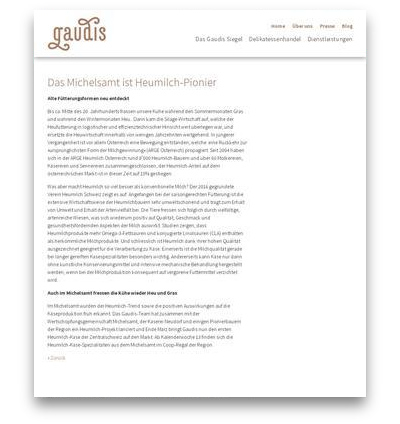
Michelsamt is a hay milk pioneer
Old forms of feeding rediscovered Until around the middle of the 20th century, our cows ate grass during the summer months and hay during the winter months. Then silage farming emerged, which was far superior to hay feeding in terms of logistics and efficiency, and largely replaced hay farming within a few decades. In the recent past, a movement has emerged, particularly in Austria, which propagates a return to the "most original form of milk production" (ARGE Österreich). Since 2004, around 8\,000 hay milk farmers and over 60 dairies, cheese dairies and alpine dairies have joined forces in ARGE Heumilch Österreich, and the share of hay milk on the Austrian market has risen to 15% during this time. source: www.gaudis.ch


